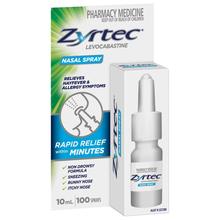Find out the what, how and why your body reacts when you breathe in allergens.
stop_sneezing.png

What Causes Sneezing From Allergies?
One of the most common (and annoying) symptoms of allergies is sneezing. Allergens can make you sneeze once, twice or even repeatedly.
Here’s the low down if you’ve ever wondered what causes sneezing from allergies and why?
The Start
You know that feeling, when your nose starts to twitch? That’s the start of a sneeze.
The Cause
Your immune system detects and reacts to allergens in the air that are usually harmless.
As soon as you come into contact with the allergens, your immune cells release a chemical called histamine.
The Build Up
When your body reacts to the histamine, your nasal passages swell up, and your nose and throat become itchy.
The Sneeze
This is when your brain tells the muscles in your chest to contract. Your eyes and soft palate close, and you sneeze.
Why Does Pollen Make You Sneeze?
It’s not new news that hayfever can make you sneeze. But to understand the reasons why a little more, we need to look into the source: pollen.
Pollen is released into the air by trees, grasses and weeds during pollination. It’s in the air we breathe, and is usually harmless. Unless you have a pollen allergy, or “hayfever”. In this case, pollen can make you sneeze!
Here’s how: when pollen gets in your nose, it creates irritation. The immune system mistakes pollen for invading germs. This triggers the release of chemicals like histamine, which alert the brain a sneeze is needed to force the pollen out. If you inhale more pollen with each new breath, you’ll continue to sneeze.
Think of sneezing as a warning that you’re breathing in a high concentration of pollen. The short-term solution is to get out of that environment. But over the long term, it’s best to figure out the types of pollen you’re allergic to, and if possible, remove the sources.
So that’s why pollen makes you sneeze. And the more you know about your allergies, the better you’ll understand your condition and the more prepared you’ll be in tackling them head on.




